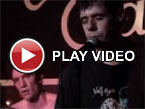Fenn O'Berg "Magic & Return"
 Editions Mego has finally reissued the woefully out-of-print complete recorded oeuvre of this massively influential and infrequently convening laptop supergroup. Unsurprisingly, it still sounds great.
Editions Mego has finally reissued the woefully out-of-print complete recorded oeuvre of this massively influential and infrequently convening laptop supergroup. Unsurprisingly, it still sounds great.
Editions Mego
Christian Fennesz, Jim O’Rourke, and Peter Rehberg made their unexpected group debut in 1997 at the Nickelsdorf Festival and embarked upon a rather weird and decidedly unprolific trajectory before eventually going on hiatus in 2002 (they are planning to resurface for a new album in 2010). Despite only releasing two improvised live albums (not a single studio album) and playing in front of frequently indifferent or even hostile audiences that expected actual guitar-playing (Jim O’Rourke was even allegedly forced to play a short acoustic set at a show in Rome), this trio ultimately wound up defining the entire laptop improv genre. These two albums still sound fresh and inspired today and certainly hold their own with the best of each artist’s individual work (though arguments from Fennesz fans would not be entirely unwarranted).
The Magic Sound of Fenn O’Berg is comprised of highlights from the band’s extensive world tour in 1998-1999. It begins with the brilliantly demented “Shinjuku Baby Pt. 1,” which is a surrealist barrage of abstract electronic buzzing, squelching, cartoon sound effects, mangled pop music, warm synth washes, subterranean rumbles, and crackling static. Twisted electronic chaos remains the theme for the rest of the album, but the trio’s unique sensibilities complement each other quite well and humor, unpredictability, and sublime beauty all manage to uneasily coexist. In fact, the album sounds surprisingly composed and spacious for a series of live improvisations; it rarely (if ever) sounds like an accidental pile-up or a bunch of competing, independent themes. While it is generally inspired and enjoyable, however, the whole album is essentially a prelude to the lengthy and brilliant “Fenn O’Berg Theme,” which marries a slow-motion shuffling jazz beat to a melancholy orchestral loop and a hauntingly noirish pitch-shifted trumpet hook (or perhaps a French horn), then buries it all beneath an onslaught of textured electronic entropy. It is an absolutely staggering, must-hear track.
The Return of Fenn O’Berg is culled from the band’s two 2002 performances (one of which was at a nearly empty jazz club in Vienna). The explosively dense opening track (“Floating My Boat”) makes it immediately clear that the group had progressed quite a bit from their earlier work. It begins with what sounds like mangled house music being showered with shattering glass or seashells, but then becomes enveloped in increasingly prevalent non-musical crackling and rumbling before shifting gears again into backwards strings, clattering free-jazz drumming, glitched-out ambience, and ultimately cinematic string swells accompanied by a thunderstorm. The similarly excellent piece that follows, “A Viennese Tragedy,” begins with stuttering abstract weirdness violently colliding with what sounds like a ‘70s soft rock sample. Much of what follows is somewhat deranged and random-seeming, but it is unpredictable enough to remain compelling until it finally coheres into a dreamlike, beautiful, and submerged-sounding classical music loop around the nine-minute mark. Of course, sustained beauty is not what these guys came here for, so the idyllic interlude is rapidly obliterated by cavernous, echoey squeals and metallic creaks, but it is amazing while it lasts (like Gavin Bryars' The Sinking of the Titanic condensed into one glorious minute). The remaining two tracks, “Riding Again” and “We Will Defuse You,” are also quite good, but nothing on Return quite matches the prior album's highlight of “Fenn O’Berg Theme.” Nevertheless, Return is the probably the more consistent and inspired of the two albums.
This reissue also includes two rare bonus tracks: “(5,6m Of) Fenn O’Berg” (which originally appeared on a 1999 compilation entitled Sonar 99) and “Adidas Sun Tanned Avant Man” (which was originally released only on the original Japanese edition of Return). While neither is particularly brilliant or essential, they do not sound at all extraneous and blend seamlessly with the surrounding material. Of course, the presence or absence of extra songs is rather irrelevant here: these albums contain some of the wildest and most lively electronic experimentation/improv of the last two decades and they are finally back in print. There is no need to throw added incentives into the mix.
samples:



